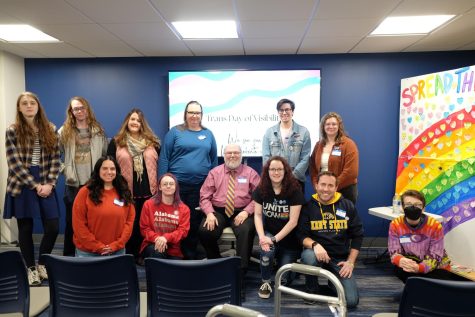Trans students celebrate visibility
In May, Jacob Nash will celebrate 25 years of coming out as a transgender man. He celebrates his differences and challenges by supporting others who are beginning their journey of visibility.
Nash said he doesn’t want to blend in. He said his transition has made him into the person he is today. His process of transitioning into the use of his preferred pronouns, hormones, surgery and authentic lifestyle has been a part of his visibility journey whether he realized it or not, he said.
Nash spoke about his experiences and encouragement for trans students at Kent State University’s visibility day event in the LGBTQ+ Center Friday. International Trans Day of Visibility is March 31.
“Us being able to tell our own stories, in our own way, in the best way that makes us comfortable can help to be visible to others,” Nash said. “Visibility is so important. I look at myself as a husband, dad to four-legged friends, a Christian, a singer, and oh, by the way, I happen to be a trans man.”

While laws arise banning gender confirmation surgeries and hormones across states like Tennessee’s ban on drag and gender-affirming healthcare for minors, Nash says people are misinformed about what it means to be transgender. He said his gender has nothing to do with his sexual orientation or being a sexual being – it is simply who he has always been.
“People are afraid of what they don’t know,” Nash said. “This country has gone back in time. When I first transitioned, there were not laws banning my existence.”
As transgender people continue to face discrimination and violence in America, Nash has hope for those who may be beginning their path to a visible and authentic life.
In 2011, Nash founded Margie’s Hope, a program assisting the lives of transgender, nonbinary and gender-expansive people in Northeast Ohio. He dedicated his life to supporting members of the trans community and advocating for trans rights.
Robin Ryder, a sophomore mechanical engineering major, shared her struggle to find gender-inclusive housing when first arriving at Kent’s campus.
At the beginning of the spring semester, she was placed on an all-male floor of Koonce Hall. After contacting housing services and requesting a room change, Ryder moved to Korb Hall, which has gender-inclusive housing. Ryder wants more gender-inclusive housing on campus, without struggle, extra cost and discrimination for LGBTQ+ students.
Madison McCartha, a freshman sociology major, said she found a sense of belonging on campus thanks to spaces like the LGBTQ+ Center and her campus job, which have provided resources for people navigating the space on their own terms.
Nash and the members of the LGBTQ+ Center said they stand by transgender, nonbinary and gender-expansive people and offer resources to those who need support.
In the fight to overcome the discrimination faced by the trans community, Nash urged students on campus to write the legislation and represent trans people in the media and on the streets. He has hope for the future generation to make a change and live truthfully, with the help of allies of the LGBTQ+ community and education about trans people.
“Some people don’t want to hear these stories,” Nash said. “But, if I was not visible … if I didn’t share my story, they would never believe it.”
Irene Bowser is a reporter. Contact her at [email protected].

